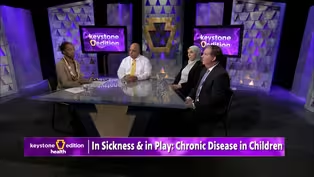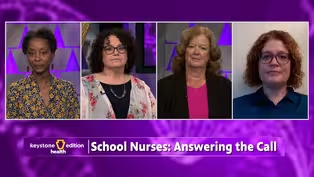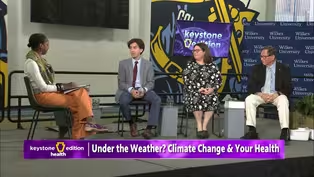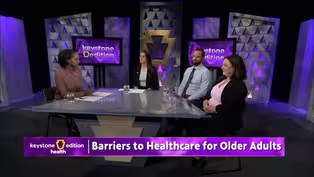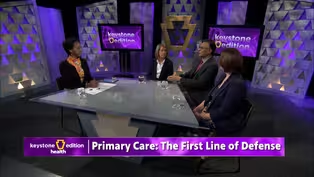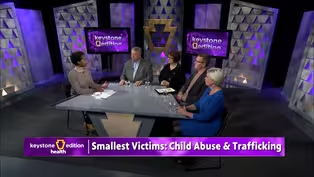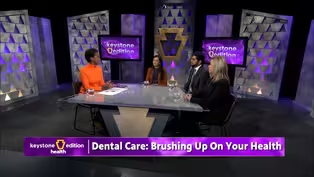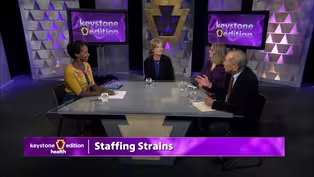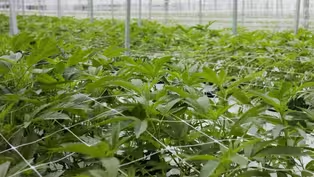Keystone Edition
The Business of Cannabis
11/28/2022 | 26m 59sVideo has Closed Captions
What does the cannabis industry mean for Northeastern and Central Pennsylvania?
With medical marijuana legal in Pennsylvania and recreational becoming legal in surrounding states, the business of cannabis is growing. Dispensaries have arrived and students can study the cannabis industry at area colleges. What does the cannabis industry mean for Northeastern and Central Pennsylvania, and how will it impact the health of our region?
Problems playing video? | Closed Captioning Feedback
Problems playing video? | Closed Captioning Feedback
Keystone Edition is a local public television program presented by WVIA
Keystone Edition
The Business of Cannabis
11/28/2022 | 26m 59sVideo has Closed Captions
With medical marijuana legal in Pennsylvania and recreational becoming legal in surrounding states, the business of cannabis is growing. Dispensaries have arrived and students can study the cannabis industry at area colleges. What does the cannabis industry mean for Northeastern and Central Pennsylvania, and how will it impact the health of our region?
Problems playing video? | Closed Captioning Feedback
How to Watch Keystone Edition
Keystone Edition is available to stream on pbs.org and the free PBS App, available on iPhone, Apple TV, Android TV, Android smartphones, Amazon Fire TV, Amazon Fire Tablet, Roku, Samsung Smart TV, and Vizio.
Providing Support for PBS.org
Learn Moreabout PBS online sponsorshipMore from This Collection
Healthcare is constantly changing as technology finds new and better ways to help people live longer, healthier lives. Host Tonyehn Verkitus will address the issues that are important to the people in our community, including the ongoing pandemic, concerns about vaccines, food deserts, childhood trauma and child abuse, mental health, environmental issues, and the rising cost of staying healthy wit
Domestic Violence: Breaking the Silence
Video has Closed Captions
Access to the right resources can make facing this challenge a little easier for families (26m 59s)
In Sickness and in Play: Chronic Disease in Children
Video has Closed Captions
About 25% of children in the US aged 2 to 8 years have a chronic health condition (27m)
Video has Closed Captions
Homelessness can happen to anyone at any age or socio-economic status. (26m 59s)
Video has Closed Captions
As we raise the visibility on Transgender young adults and embrace them within our culture (26m 59s)
Video has Closed Captions
Obesity is a serious risk factor many try to avoid when developing healthy eating habits. (27m)
School Nurses: Answering the Call
Video has Closed Captions
What can our school districts do to help retain and recruit nurses for future generations? (27m)
Under the Weather? Climate Change & Your Health
Video has Closed Captions
How does climate change impact individual and public health? (54m 59s)
Barriers to Healthcare of Older Adults
Video has Closed Captions
What progress have local organizations made in addressing these challenges? (27m)
Primary Care: The First Line of Defense
Video has Closed Captions
When was the last time you saw your primary care doctor? (27m)
The Smallest Victims: Child Abuse & Trafficking
Video has Closed Captions
What are the signs to know to spot child abuse and even possible trafficking? (27m)
Dental Care: Brushing Up on Your Health
Video has Closed Captions
How can providers make dental care more affordable and accessible? (26m 59s)
Video has Closed Captions
Low staffing levels can lead to burnout among healthcare workers (27m)
Providing Support for PBS.org
Learn Moreabout PBS online sponsorship- [Narrator] Live from your public media studios, WVIA presents "Keystone Edition Health."
A public affairs program that goes beyond the headlines to address issues in Northeastern and Central Pennsylvania.
(soft music) This is "Keystone Edition Health."
And now, Moderator Tonyehn Verkitus.
- Good evening, and welcome to "Keystone Edition Health."
I'm Tenyehn Verkitus, thank you for joining us.
Tonight, we'll look at the growing sector in the healthcare field, cannabis.
Now that Pennsylvanians are able to access medical cannabis, how has it improved our health?
Our experts will discuss.
But first, let's hear from WVIA's Paul Lazar.
(graphics whooshing) (soft electronic music) (gentle music) - [Paul] Medical cannabis has been legal for Pennsylvania residents since 2016, and available from doctors and dispensaries since 2018.
In that time, the business of cannabis has grown throughout our region, with dispensaries and prescribing physicians available throughout Northeastern and Central Pennsylvania.
Patients can only get a medical marijuana card if they register with the state, and have a physician certify they have a qualifying medical condition.
The Pennsylvania Department of Health reports more than 2,000 physicians throughout the state are able to provide that certification as of May 2022.
Once they obtain a card, patients must then go to a qualified dispensary to purchase medical cannabis.
As the business of cannabis grows, physicians are gaining more understanding of how medical marijuana can benefit individual patients, and the health of our communities as a whole.
For "Keystone Edition Health," I'm Paul Lazar.
- Joining us tonight, we have Alexandra Panek, pharmacist and adjunct faculty member with Wilkes University's new cannabis studies program.
Also here in studio, we have Dr. Christopher Connor of Northeastern Rehabilitation Associates.
And joining us via Zoom is Gary Seelhorst, Senior Vice President of Compliance and Governmental Affairs for Justice Cannabis Company.
Welcome, everyone.
- Thank you for having us.
- Absolutely- - Thank you.
- Lexi, I'd like to ask you, can you start by telling us what medical marijuana is, and how does it differ from recreational?
- Sure.
So really, the big thing with medical marijuana is, the state does have pretty strict regulations as to testing, and things like that.
So, just like a regular medication where if they give you a blood me pressure medication that's a certain dose, you know what you're getting, whereas medical cannabis products are heavily tested, so you kind of know the breakdown of everything that's in the product that you're using.
And of course, you would need your medical card in order to access it.
And there are technically legal ways to consume the products, whereas recreationally, obviously in Pennsylvania, it is not recreationally legal.
So yeah, that's really the big difference there, and then obviously, the products aren't gonna be as regulated as they are through the state.
- Gary, when someone's thinking about opening a dispensary, what sort of legalities do you have to go to, and what sort of eligibility is required?
- Yeah, yeah, good question, I get asked that quite a bit.
There's a couple different things that you have to consider when you're going about sort of the whole licensing process in general.
So, there's an application process by which they're actually gonna evaluate the operators that are actually going to be part of the operations.
They do background checks, they wanna make sure that everyone's financially solvent, they don't have anything in their background that might suggest that they would do something illicit.
And then they look at the location.
Is the location, the community, is everyone okay with moving into that specific location.
And then, the state does a pretty decent job of trying to space out a lot of the different operators, so they're not all clumped in certain regions.
So, you wanna make sure that, especially with the dispensary, there's a lot of different ways to look at it from a financial perspective, but a lot of the capital that you need to raise, I think is sometime minimized as you go into the whole process.
You really need to have about a million dollars in capital if you wanna go through this whole process.
And that'll cover essentially the initial build out of the facility, all of the technology that you need in order to go through the track and trace process.
A lot of the employees that you'll be hiring in order to not only just operate the dispensary, but sort of the back of the house folks that are gonna be doing the accounting, security, and everything else that's involved with the whole process.
So yeah, there's quite a bit involved in getting everything through the application process, and then it goes through the Department of Health.
And they're the ones who actually sort of make an assessment on whether they think you're gonna be good operators or not.
- And for physicians, I'm sure there's a eligibility process as well if you're gonna be a person who's doing certification for patients.
- There is.
Obviously, you have to be a licensed healthcare provider, a physician in the state.
The state also requires a course, typically online, I believe four hours.
And then you can begin to certify patients, and then each physician kinda chooses their own comfort level based on kinda conditions they're willing to to see and qualify patients for.
- So, I know there's a lot of different qualifying reasons to have a medical cannabis card.
You as a pain medicine physician will most likely be looking at pain primarily.
But what are some of the other qualifying factors, and then we can talk a little bit about pain.
- I would say, from my experience in a dispensary, the most common ones I saw were definitely pain, and then anxiety.
You can also, I believe there's 26 conditions in Pennsylvania that you can have to qualify for a card.
Things like cancer, so patients who are going through chemotherapy might use it for relief of like nausea, and things like that.
Different like musculoskeletal diseases, MS, ALS, things like that.
Yeah.
- And for your patients?
- I mean, from the patients dealing with pain, whether cancer-related or chronic non-cancer pain, it's been a great tool that we now have access to.
I would say in my experience, the two biggest benefits has been as an alternative to opioid medications for patients with severe chronic pain, as well as patients who are on opioids but trying to get them down, or completely off, it has been valuable in that regard.
- Gary, when we're talking about qualifying conditions, is this something that the dispensary might be working on in terms of increasing qualifying conditions?
Or, does this come straight from government?
- It comes straight from government.
There's an advisory board that the state actually has incorporated into their governmental body, and they sort of adjudicate a lot of the different qualifying conditions that are presented before them.
It's actually a very high-functioning board because you have a lot of the caregivers, you have physicians, you have attorneys, you have a lot of the different operators that are in the industry that are seeing a lot of the patients right at the tip of the spear too.
And so when we were actually back in the COVID timeframe, was when they had amended the qualified conditions list to include anxiety.
And you saw the market essentially double.
Because as you probably know, there's a lot of folks that are treated with cannabis, specifically for anxiety.
So, that was encouraging to see that it was utilized so well, and obviously, it was very timely given a lot of the anxious moments that we had during COVID as well.
- You talk about the market doubling with anxiety.
Where does the product come from?
And who is growing product, and creating the different types of materials that people can buy?
- Right.
So, it all has to stay within state lines.
Nothing comes from outside the state lines in the legal industry.
So, you have cultivators that are growing the actual, the product.
And then, there's flower, that's the product that's sold in jars, then you have extraction processes where they're looking at oils that go into cartridges.
And there's various products that have certain medicinal qualities, and it is one of the things that we really try to dial into is, what works best for each patient.
Because what works for one patient might not work for another patient based on dosing and strains, and the different form factors too.
- Chris, we're talking about what we're going to dose our patients with.
How do you make a determination for someone, and then to follow that up Lexi, once they come into the dispensary, how are these products handled and doled out?
- It's actually very difficult.
And I think there's something we talked about earlier is, research still is in its early stages, and it's for a whole host of reasons.
But so to actually say with certainty you need this product, this percentage, CBD, THC, this terpenes, it's very difficult.
For a lot of my patients, especially my elderly patients, my primary goal is to kind of educate them on what might be usable during daytime, evening, and maybe a safe starting point.
Let them get used to the product, and then we could kind of build from there to see, okay, with the starting product, okay, there was no side effects.
Did it help?
If it did, okay, what were some of those kind of foundational components?
And then we build on that as we kinda go.
But we really do rely on the pharmacist at the dispensary as well.
- Yeah, and to kind of play off of that, so a patient will come into the dispensary, they have to present their medical card, we have to make sure it works in the system, and all of that.
And as the pharmacist, I actually have to check the Department of Health database, like through the state, which is sort of similar to the PDMP, which would be used for opioids, and things like that.
And on there, I can see the certification that doctors submit, so sometimes, doctors won't really add any details, it'll just be like they're approved, they can use whatever you recommend, and then that sort of gives me free rein as to what I might recommend for them.
And then some doctors do make recommendations like, they can't use these types of products, or I only want them to use this.
It needs to have this ratio of THC to CBD.
And so, I'll take patients and sit down with them, talk about their goals, any past cannabis experience, and sort of set a plan for where we wanna go, what they're looking to achieve.
I generally will start low and slow, especially for like cannabis naive patients and older patients.
I would rather have to increase your dose on something than give you something that's way too strong, and then that whole product is kind of out for you 'cause you're not willing to try it again.
But so, a lot of it really is just individually to the patient's needs, and then kind of once they know what they want, they'll go back on the sales floor and make their purchase.
We have, there's vaults that contain all of the different products, organized by different strains, different types of products, and that'll be passed out to the patients, and they'll purchase it and go on their way.
- While the business of cannabis can impact our region as a whole, we also want to talk about the impact medical cannabis use can have on an individual's life.
WVIA met Marissa Pisano, who has been a medical cannabis patient since 2020.
She shared some of her experiences with us.
(graphics whoosh) (soft electronic music) (cannabis shuffling) - With medical marijuana, with cannabis, (container swishing) it helps me slow down enough to be like calm down, to be like, (sighs) okay, we're here, we're just relaxing, it's not here.
(cannabis shuffling) I still use Prozac for my depression, which does help, but I mainly use this on a daily basis.
(lighter flicks) It has helped a lot immensely with retaining focus, and just trying to like de-escalate and calm down.
(Marissa exhales) Once I figured out how to use this appropriately, I can do that.
I was diagnosed at five, I started becoming medicated at 13.
So, I was on Adderall for multiple things, and with Adderall, like it was helpful, don't get me wrong, it was 100% helpful for keeping focus, and like, keeping me on task and everything.
But the worst part of it is, is it would affect your appetite, I would not eat.
I would also have trouble sleeping because it's a stimulant.
Doctors wanna prescribe a lot of opiate first instead of trying this first.
That's how we got to where we are with heroin and the opioid crisis.
They approved me for my ADHD.
Strangely enough, (chuckles) it wasn't that hard.
Literally, my friend gave me a doctor to call, I called them.
And they just did over telehealth, like over through my computer.
And we just simply talked about what I needed, I told him about my anxiety, this and that.
He's like, well, you're definitely approved, and he wrote off a thing.
And sent it off to the state.
(door bell dings) (door squeaks) Since I've been doing this with my therapy and other stuff as well, I've seen an improvement in my sleep, my skin tone.
And this also makes me more comfortable in social situations to be myself, where it's like, in other situations, I would have difficulty with.
(hands shuffling) It's just really wild how much it helps people.
(graphics whoosh) (soft electronic music) - Gary, we were talking a little bit before about strengths and strains of THC.
What types of trends are you seeing right now in the market in terms of what people prefer?
And is it true per chance that something that's stronger would be better for you?
- Not necessarily, and I think that's one of the things that's a big misconception.
And you actually see that in the marketplace as well, you see a lot of the higher potency, higher THC products that are actually, they cost more.
And that's just sort of the reality of the market right now, but it doesn't necessarily translate well into efficacy.
As my panelists I'm sure would agree with, but you tend to see in sort of the holiday sort of time period, you see a lot of anxiety.
Folks are anxious about making sure that everything's taken care of during the holidays.
We see an increase, typically of some of the higher potency flower products, and also some of the cartridges as well.
And that's sort of, that can be cyclical just because of the nature of what's going on during that time of the year.
And then we might see sort of a shift to other sort of tinctures, and things of that nature, but typically, you don't see a whole lot of fluctuation because once a patient will find something that works for them, they'll stick with that for as long as they can, as long as the supply is there.
So, that's usually kind of what we do as an operator, and looking at the supply in the market.
- Chris, can you share with us some stories about efficacy anecdotal that you've had from patients?
- Yeah, in my own experience, and I tell my patients when we're first kind of talking about this that, does it help everyone?
No, but it definitely helps a lot more people than it doesn't.
And again, my practice, treating chronic pain.
So, we're usually looking at products that have a longer half life.
So, typically, we try to stay away from the inhaled products if possible, but some patients, for kinda what we call breakthrough pain or more acute pain, they will utilize that, so we're kind of trying to utilize most likely a blend of longer-acting, shorter-acting products.
And again, in my experience, in the patients who it's worked for, a large number, we've either been able to come off of opioid medications, replace it with it, or decrease the overall dosing they're on.
- And for you, Lexi, when people come in asking for recommendations, how often might they have to change and tweak before they find what works for them?
- It really depends on the individual.
Some people, they like the very first product I recommend to them.
They continue to use that same product over and over again.
Other patients, like I said, my technique generally is low and slow.
I'll start with the lower dose, and kind of work the way up.
And sometimes, it's not enough, so they do have to increase their dose, or change the product that they're using.
Even, for example, like a tincture, you can have different doses, there's like the lower, like the .25, it's in a dropper.
And then you can use like more or less of a dropper, so even just adjusting that between their visits, and kind of going from there.
And they might even switch up, for example, they might be using a longer-acting product, and it's not helping when they have things like breakthrough pain or breakthrough anxiety.
And so, then I might change recommendations, and maybe try a shorter-acting product, and just, really just keep working with them, and adjusting until they are happy with where they're at.
- Gary, at the dispensary, I know that locally, you are producing products here in Pennsylvania.
How often are they testing and doing trials for new tinctures or smokable products?
- So, we have a grower processor, a plant in Hazelton.
And so what we do is, we do a lot of internal testing.
And as one of the other panelists had mentioned, there's a lot of third party testing that we do with labs in order to really get a better understanding of what we're getting out of those products that we're seeing that are coming off the harvests.
So, we get certain THC level, CBD level, and then terpenes are actually really important as well.
You wanna see a specific terpenes profile sometimes when you're eliciting a certain effect from a medicinal standpoint.
So, that's basically an ongoing process for us.
I mean, we're really always doing it.
But we're going back to, we employ a lot of pharmacists that are talking to a lot of the patients, and so we wanna get a lot of feedback from those pharmacists to see exactly what's working for 'em.
And if there's anything that we kinda need to go back to the drawing board for.
Because we certainly have products that are in high demand, and then we have others that might not necessarily have that kind of demand, but we wanna know what the patients are using as well.
And if there's anything that's very efficacious for those patients, then we wanna start recording that in our own sort of aggregated database too, which I think is something that's kinda lacking in the field right now, so that when you have physicians and pharmacists that wanna refer back to some historical data that seems to be working for certain types of patients, that you wanna have that available to you.
But right now, it's really just empirical data, it's just the experience of the different medical professionals.
And so, that's really what they have to go on at this point.
- So as there's more products and more patients, obviously, we'll need more pharmacists.
Wilkes now has this new certificate program, can you tell us about that?
- Yeah, so this is actually the first semester they're having this program.
So, there is both a certificate program available for the pharmacy students, and there is also a new cannabis science major as a whole.
So really, for pharmacy students, it's very helpful for anybody A, interested in getting into the industry.
I did not have really a whole lot, I got I think one lecture of sort of a very broad overview of cannabis in Pennsylvania, and how the program works.
But really, everything else is from kind of on the job experience.
And so, now these students will kind of have the chance to have some of that background knowledge going into it, and feel a lot more comfortable.
I know there were times I really, I felt like an imposter telling people things, I'm like, I really don't know, but we're gonna try this.
So, it's nice to give them that experience, and even if they're not necessarily going to get a job in the industry, it's really helpful even just working as a regular pharmacist to have general knowledge of cannabis products.
People do ask about drug interactions and things like that, and it's nice to be able to provide that information, and understand kind of what you're talking about.
And then from the cannabis science major aspect, of course we need people to work in the grow facilities, and to do extraction and testing, and things like that.
And again, it gives them a good baseline knowledge of kind of what they're looking for, and really just make them more successful in the field, make it more competitive.
It is definitely a very competitive field to get into.
Everybody wants to work in it.
Obviously, there's only so many jobs, so having that leg up is definitely helpful.
- You mentioned drug interactions, and that was something that I was gonna ask each of you to touch on.
I'm sure there is some fear about there being some medications that may interact poorly.
I guess I'll toss it to you first, Gary, do you all do any research to look at interactions that could be adverse- - Yep.
We really go back to the pharmacists to see what their experiences, and so the medical professionals are really the ones that sort of adjudicate that whole process.
And that's why it's really, really important for those pharmacists to be able to have that open line of communication with the physicians.
So that they can go back and forth to see anything that's worked, or anything that's kind of gone sideways with any adverse events that happen too.
And so, that's why I kinda keep going back to this aggregated database that really needs to really be sort of registered and certified, so that people can kind of refer back to it.
And it should be a growing database as well, as as we start to pull in a lot of these new and interesting data points with all the different products versus the indications that they're prescribed for.
- Have you had any concerns with your patients or had anyone that had some sort of adverse experience?
- Well, regarding cannabis and concurrent medications prescribed, luckily for the most part, things have run smoothly.
Obviously, one of the big concerns when first starting was with blood thinners, especially Coumadin.
I mean, at least that one we can check levels.
So initially, when the program rolled out, we would kind of check INR levels which measure Coumadin levels weekly, then kind of every other week, and then get back to the monthly schedule, and I had not never saw really fluctuations in Coumadin levels from use of cannabis.
In addition to some of the medications, we have to be concerned about, also too, we have to consider their medical conditions.
Patients with bad liver or kidney disease, heart issues, especially arrhythmias or uncontrolled blood pressure, those are important things to take into consideration prior to enrolling.
- And as we mentioned, there is no PDMP for this, which is the prescription drug monitoring program for anyone who may not know.
So, do you have to count on your patients to just say, yes, I was at a dispensary today (chuckles) and purchased XYZ.
- That's definitely, I think where there's definitely room for some growth.
Even on both ends of the spectrum, if you're in the dispensary and you're trying to make recommendations, it's important to know things like the medications they're taking.
And you have to, if they don't tell you, then you don't know.
And that's kind of all there is.
And it's the same way working in a medical facility if a patient doesn't disclose to you that they use medical marijuana, you really don't have any way to know.
And it definitely, I always encourage patients to share with their healthcare team that they are, if they're in the program, I mean, it's okay.
But there are definitely situations where you would want to adjust medication levels, or just be more cognizant of their dosing, and things like that.
Even things like anesthesia, you might have to adjust levels in surgery, and all of that.
So, it's definitely very important from a patient aspect to just be open with your healthcare team that you are in the medical program, because it really could.
It could make some impact on decisions.
- Gary, I'd like to ask you if you think that recreational cannabis is anywhere on the horizon for Pennsylvania?
'Cause I'm sure there's folks that would like to know.
- Yeah, no, and it's a great question too, especially on the heels of the election.
So, we have Governor-elect Shapiro who's coming in to office, and he's definitely pro cannabis.
So, the state, the way the state is kinda set up, you have the assembly and the Senate, and they're both controlled by Republicans.
But you see a lot more folks on the right that are starting to really come along as far as the value that they see in the cannabis industry.
And so, with Pennsylvania, there aren't valid initiatives, so this all has to go through the legislature.
And that's one thing that we do a lot as operators, is we try to pull together in these trade associations, and we're actually meeting in DC this week to talk about the potential- - I'm sorry to cut you off, Gary, we've come to the end of our time.
I would like to thank all of our guests for joining us tonight.
I'm Tenyehn Verkitus, have a good evening.
(airy music)
The Business of Cannabis - Preview
Preview: 11/28/2022 | 30s | Watch Monday, November 28th at 7pm on WVIA TV (30s)
Providing Support for PBS.org
Learn Moreabout PBS online sponsorship
- News and Public Affairs

Top journalists deliver compelling original analysis of the hour's headlines.

- News and Public Affairs

FRONTLINE is investigative journalism that questions, explains and changes our world.












Support for PBS provided by:
Keystone Edition is a local public television program presented by WVIA

